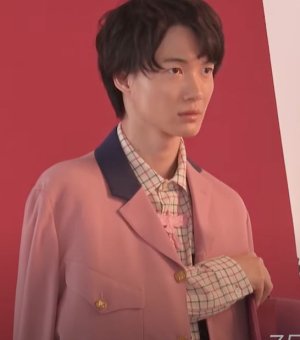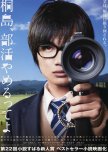This movie is one of the most genuine portrayals of high school life in Japan
The Kirishima Things looks a bit simple on first glance, there's a sharp and poignant little film hiding behind its inconspicuous facade.
Yoshida is know to balance his work between comedy and drama, but his true signature is the cheeky, somewhat darker sense of humor that can be found in each of his films. Not always in the same quantities or with the same vibrance, but it's always there, lurking and waiting to leap out at the audience. Even though The Kirishima Thing's dramatic impact clearly outweighs the comedy, fans of Yoshida's work are sure to flash a couple of devious smirks while watching.
One of the smaller details that had me amused early on, is the chapter approach Yoshida took to work his way through the story. While he opted to split the narrative in classic days-of-the-week divisions, the first four segments are in fact alternate takes on the same event, all aptly titled "Friday". Not very functional, I admit, but definitely worthy of a respectful smile. There are several similarly fun details and/or moments, but it's really up to the audience to filter them out. Should you miss them though, no need to worry because the film is easily able to survive on its dramatic strengths alone.
The story revolves around Kirishima, a model student of a local high school. With a volleyball final and university selections coming up, Kirishima shuts down completely and disappears from public view. Nobody knows what exactly happened, but he isn't responding to anyone, not even his best friend and his girlfriend can get through to him anymore. Without a clear role model, the class scrambles to get through one of the most critical moments of their year, at the same time the disappearance of Kirishima prompts several of his classmates to crawl out from under of his shadow.
Yoshida's visual style may not be all that flashy or in your face, but it is ultracrisp. Tight camera work, strong contrasts and bold color tones (mostly blues, but the film doesn't look cool or dreary in the least) all help to make the visuals pop. In broader lines it isn't all that different other Japanese dramas, but where those tend to go for a softer and dreamier vibe, Yoshida isn't afraid to keep it clean and potent. Bottom line: the films looks beautiful.
The soundtrack is mostly notable in its absence. There are maybe two or three scenes where additional music was added to the film and one sequence where a brass band rehearsal is mixed into the main narrative, building up to a rather impressive climax. The rest of the soundtrack is just ambient noises, though often set up in such a way that they do create some sort of practical rhythm. It shows that Yoshida is very much aware of the power of sound, but is restrained enough to use it only when he feels it would add something to his film.
Acting Wise there's nothing to complain about either. Equal parts deeply affecting and funny, with Ryunosuke Kamiki's (Ryoya Maeda) performance mostly supplying the latter. His comic timing and movements moved the audience at the Japanese embassy's annual film festival here in the Philippines to tears (from laughter, that is). The stereotypes are only mild and understated and none of the characters are too introverted, so even audiences used to Western films should have an easy time getting through to the characters.
What's most interesting about The Kirishima Thing is that its main character is never really there. Apart from the introduction (where we see him a couple of times from the back - though without the context of the rest of the film you won't even realize), Kirishima is entirely absent. Even so, his presence is felt in every scene. Don't expect to learn anything about him either, as the film is more interested in examining the effect Kirishima's absence has on his classmates. The themes here are pretty universal and recognizable, except that the focus on the Japanese school system and its fascination with school clubs might still alienate some people.
While Yoshida has quite a few stories to tell and quite a few angles to explore, the film still feels like a very tight package, sporting little to no cruft. The Kirishima Thing is not a spectacular film, but Yoshida's direction is so deliberate and steadfast that it sucks you right in from the start. It's beautifully shot, aptly scored and well acted and it gets extra bonus points for its Tetsuo hommage. An easy recommend for Yoshida fans, but I feel pretty confident the film could also appeal to a wider audience.
Yoshida is know to balance his work between comedy and drama, but his true signature is the cheeky, somewhat darker sense of humor that can be found in each of his films. Not always in the same quantities or with the same vibrance, but it's always there, lurking and waiting to leap out at the audience. Even though The Kirishima Thing's dramatic impact clearly outweighs the comedy, fans of Yoshida's work are sure to flash a couple of devious smirks while watching.
One of the smaller details that had me amused early on, is the chapter approach Yoshida took to work his way through the story. While he opted to split the narrative in classic days-of-the-week divisions, the first four segments are in fact alternate takes on the same event, all aptly titled "Friday". Not very functional, I admit, but definitely worthy of a respectful smile. There are several similarly fun details and/or moments, but it's really up to the audience to filter them out. Should you miss them though, no need to worry because the film is easily able to survive on its dramatic strengths alone.
The story revolves around Kirishima, a model student of a local high school. With a volleyball final and university selections coming up, Kirishima shuts down completely and disappears from public view. Nobody knows what exactly happened, but he isn't responding to anyone, not even his best friend and his girlfriend can get through to him anymore. Without a clear role model, the class scrambles to get through one of the most critical moments of their year, at the same time the disappearance of Kirishima prompts several of his classmates to crawl out from under of his shadow.
Yoshida's visual style may not be all that flashy or in your face, but it is ultracrisp. Tight camera work, strong contrasts and bold color tones (mostly blues, but the film doesn't look cool or dreary in the least) all help to make the visuals pop. In broader lines it isn't all that different other Japanese dramas, but where those tend to go for a softer and dreamier vibe, Yoshida isn't afraid to keep it clean and potent. Bottom line: the films looks beautiful.
The soundtrack is mostly notable in its absence. There are maybe two or three scenes where additional music was added to the film and one sequence where a brass band rehearsal is mixed into the main narrative, building up to a rather impressive climax. The rest of the soundtrack is just ambient noises, though often set up in such a way that they do create some sort of practical rhythm. It shows that Yoshida is very much aware of the power of sound, but is restrained enough to use it only when he feels it would add something to his film.
Acting Wise there's nothing to complain about either. Equal parts deeply affecting and funny, with Ryunosuke Kamiki's (Ryoya Maeda) performance mostly supplying the latter. His comic timing and movements moved the audience at the Japanese embassy's annual film festival here in the Philippines to tears (from laughter, that is). The stereotypes are only mild and understated and none of the characters are too introverted, so even audiences used to Western films should have an easy time getting through to the characters.
What's most interesting about The Kirishima Thing is that its main character is never really there. Apart from the introduction (where we see him a couple of times from the back - though without the context of the rest of the film you won't even realize), Kirishima is entirely absent. Even so, his presence is felt in every scene. Don't expect to learn anything about him either, as the film is more interested in examining the effect Kirishima's absence has on his classmates. The themes here are pretty universal and recognizable, except that the focus on the Japanese school system and its fascination with school clubs might still alienate some people.
While Yoshida has quite a few stories to tell and quite a few angles to explore, the film still feels like a very tight package, sporting little to no cruft. The Kirishima Thing is not a spectacular film, but Yoshida's direction is so deliberate and steadfast that it sucks you right in from the start. It's beautifully shot, aptly scored and well acted and it gets extra bonus points for its Tetsuo hommage. An easy recommend for Yoshida fans, but I feel pretty confident the film could also appeal to a wider audience.
Was this review helpful to you?






